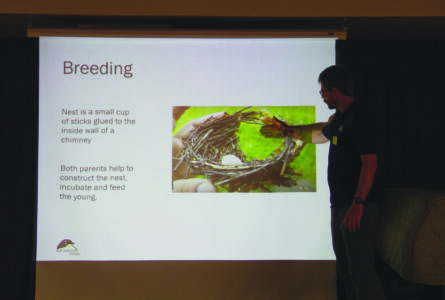Hefty utility hikes loom for Esky
ESCANABA — Escanaba residents could see significant increases to their water and wastewater bills in the coming fiscal year, following a budget hearing held virtually Tuesday, but city council members differed in their views of how much is too much for the community already strained by past rate hikes and the fresh impact of the coronavirus.
The discussion between the council and Water/Wasterwater Superintendent Jeff Lampi Tuesday — which took place after the council made decisions on a number of requests from other departments for items like software purchases and wage increases — was actually the second day Lampi defended his planned rate hikes. He had initially appeared at Monday’s virtual budget hearing, but was asked to return after wastewater rates presented were substantially higher than initially predicted as part of a multi-year plan approved last year.
Last June, the council approved what was to be the first of three annual 20 percent increases to wasterwater rates and increased the monthly availability debt service charge for sewer access above the prior fiscal year’s levels in order to fund improvements at the Escanaba wastewater plant. Among other things, the upgrades would reduce frequency of partially treated sewage being discharged into Lake Michigan.
However, bids for the work came in higher than expected, pushing the rate increase needed to complete the project as planned up to 35 percent.
In an effort to reduce the rate increase, the council and Lampi broke the project down into smaller chunks and alternative options. The recommended plan — which included a base lump sum, a reduced demolition plan for the abandoned primary treatment facilities, all work associated with raw sewage fine screening, engineering, legal, and related bond-work — would drop the increase down slightly to around 33.3 percent. In practice, this would be instituted as a 30 percent increase in the fiscal year 2020-2021, followed by two years of 35 percent increases.
“This turned into four years of increases that are larger than we anticipated,” said Lampi.
Choosing to move forward with the reduced plan means the project currently does not include the construction of an effluent booster pump station, exterior siding on the wastewater building, the construction of a vactor storage garage, upgrades to the administrative building, or the construction of a grit slurry pump building. Some of these projects, like the vactor storage garage, may be re-added to the list of projects at the wastewater plant in the future if money becomes available.
While council gave Lampi verbal permission to move forward with developing a plan for the new wastewater rates based on the reduced project, the rates won’t be considered official until April 16, when a resolution can be approved for the state. The resolution will affect the ability of the city to gain access to funding sources.
But the wastewater increase was not the only increase discussed by Lampi and the council.
Like the wastewater rate, the council approved a 45-percent increase in water rates and and an increase in the water availability charge last June. That increase was slated to be followed by a 35 percent increase in the coming fiscal year, a 5 percent increase in the 2021-2022 fiscal year, and a 2.5 percent increase in the fiscal year 2022-2023.
The increase was primarily to support the replacements of lead service lines in the city as required by a mandate from the Michigan Department of Environment, Great Lakes, and Energy (EGLE).
“My first concern is with our residents, who are going to be faced with sharp increases in the sewage rate this year, next year; the one after that, and I think there’s an absolute limit to what our residents can pay and by hitting them with more water increases on top of what we did last year? I think we may be at the breaking point,” said Mayor Marc Tall, suggesting the city put contaminated line replacements on hold.
Any line that is or was formerly downstream of lead is considered contaminated under the rules, regardless of whether or not lead can be found in the water in high concentrations. In Escanaba, that means roughly 80 percent of all lines in the city — more than 4,500 individual lines — must be replaced over the next 20 years despite lead levels in the water being well below what was previously considered acceptable. To meet the replacement schedule, the city aimed to replace 200 lines each year beginning this year.
Tall’s suggestion that the city step away from the replacement program and reduce water rates was met with mixed reactions from both council members and the city staff.
“If we did that, I don’t think we’d be the only ones doing that. I think there would be … many communities that have taken that approach,” said City Manager Patrick Jordan, who noted it could set the city behind schedule but it is also possible a change in state leadership would do away with the mandate.
Council Member Tyler DuBord spoke in favor of reducing the rates, noting the strain on resident’s pocketbooks in light of the COVID-19 pandemic.
“It’s still another hardship on top of the citizens if it’s a 30 or 35 percent increase again. No matter what you look at, it’s another hardship on them. Especially now with the coronavirus, people are out of work, the economy is crushing — there’s just a lot of factors and I’d hate to hit them again if we don’t have to,” he said.
Council member Peggy O’Connell held a different view, however. She repeatedly said the council was making up for inaction from previous councils and should stay the course, regardless of the negative response the rate increases would invariably get from some residents.
“In the beginning I did hear from a lot of people but I did ask them what they paid for cable, what they paid for cellphones, what they paid for coffee. There are a lot of things. We’re talking about not putting future generations in debt, not having a complete breakdown of our very important services that we provide to the citizens. We have to make decisions based on fact and not on the emotions of a couple people that hear a percentage but don’t actually do the math,” said O’Connell.
Lampi had his own concerns about pumping the breaks on line replacements. While he was unsure what sort of penalty the state would impose on the city if the line replacement program was to be abandoned, he also thought it could jeopardize planned projects and a $20 million loan he was in the process of applying for to cover some line replacements. He anticipated at least a portion of the loan would be forgiven by the state.
“I’m under a state mandate to follow the rules and not doing this work is in violation of those rules,” he said.
Despite reservations from DuBord and Tall, the council ultimately decided to move forward with the planned 35 percent water rate increase, which will allow Lampi to pursue the loan. The city will decide whether or not to accept the loan based on how much of the loan the state is willing to forgive.



